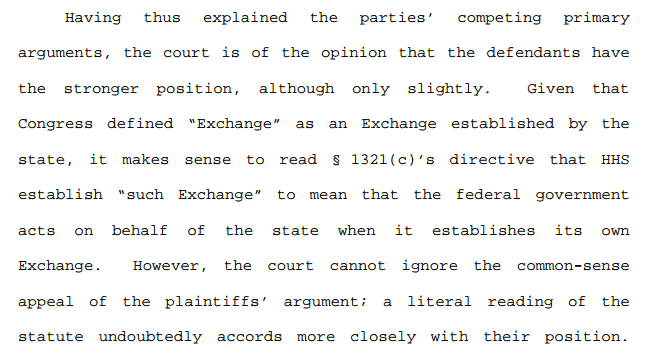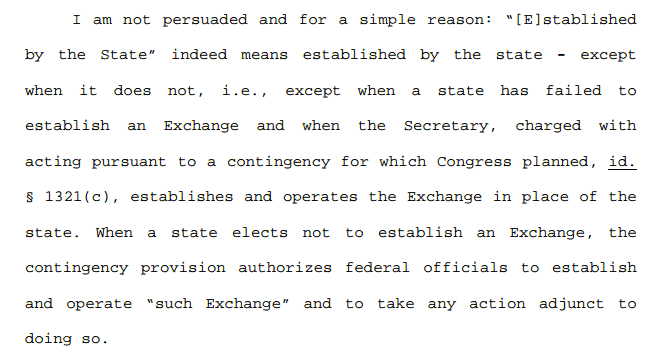How a Republican President Could Kill ObamaCare Without Congress or the Supreme Court
Hours after the D.C. Circuit handed down the Halbig decision, discussed this morning, the Fourth Circuit handed down a parallel ruling with the opposite result. Coincidence? Or did the three Democrat-nominated Fourth Circuit judges time the release of their opinion until just after the Halbig decision was issued, to blunt the public perception that the courts had ruled against Obama?
I’ll deal with the shortcomings of the Fourth Circuit’s so-called logic in more detail in coming days, but there’s one point I want to emphasize now: the decision emphasizes that, in theory, a Republican president could undo ObamaCare without the need for Congressional action, or even a favorable Supreme Court ruling.
How’s that? The answer is contained in the logic of today’s Fourth Circuit opinion.
The Fourth Circuit opinion struggles to say that “established by the state” can mean “established by the Health and Human Services Secretary” . . . and never really makes the argument that this is the logical interpretation. If a judicial opinion can be sheepish, then this opinion was bleating when its author wrote this passage:
And if you want a truly risible passage, check out this bit from the concurrence:
“Established by the state” means “established by the state” . . . except when it does not. Classic. The disregard for the text could be more blatant only if he said: “Established by the state” means “established by the state” . . . except when I say it doesn’t.
Ultimately, these judges are clearly too embarrassed to hold that the Obama administration position is so clearly right that it is the only logical interpretation. Instead, they say: well, the opponents of the law have a pretty good point, but we’re going to say the language is ambiguous, and call the arguments about its meaning a wash. And that means we defer to the interpretation of the relevant government agency . . . in this case, the IRS. The Fourth Circuit thereby relies on something called “Chevron deference,” which applies the rule (which strikes me as absurd) that courts must defer to reasonable agency interpretations of ambiguous statutes.
So let’s say that this goes up to the Supreme Court. Either they will rule the way the D.C. Circuit ruled in Halbig, or the way the Fourth Circuit ruled today. If they apply the same logic that the Fourth Circuit applied today, the presidency changing hands could change everything.
Here’s why: if Obama’s IRS can issue one rule, then President Ted Cruz’s IRS can issue a different one. The U.S. Supreme Court’s Chevron case that created “Chevron deference” said:
The fact that the agency has from time to time changed its interpretation . . . does not . . . lead us to conclude that no deference should be accorded the agency’s interpretation of the statute. An initial agency interpretation is not instantly carved in stone. On the contrary, the agency, to engage in informed rulemaking, must consider varying interpretations and the wisdom of its policy on a continuing basis.
In other words: agencies can change their minds, and we will continue to defer to them.
So, applying the Fourth Circuit’s reasoning, an IRS under Obama can say that an exchange “established by the state” can mean “established by the federal government.” But an IRS under Ted Cruz, applying the classic formulation of Monty Python’s argument sketch, could say: “No it doesn’t.”
Meaning that, even if Democrats retake the Senate in 2016 (assuming Republicans take it this year, as I expect they will), we would not need them to effect this rule change.
A President Cruz could write the Halbig interpretation into law, just like that. Boom. Done.
And if that means ObamaCare won’t work, well, hey. Live by Chevron deference, die by Chevron deference.




